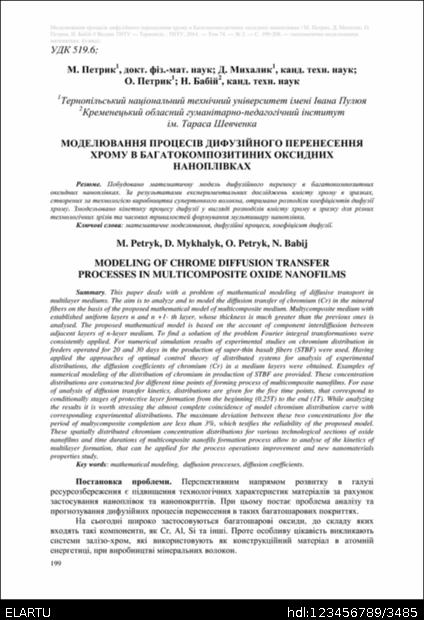Veuillez utiliser cette adresse pour citer ce document :
http://elartu.tntu.edu.ua/handle/123456789/3485

| Titre: | Моделювання процесів дифузійного перенесення хрому в багатокомпозитиних оксидних наноплівках |
| Autre(s) titre(s): | Modeling of chrome diffusion transfer processes in multicomposite oxide nanofilms |
| Auteur(s): | Михалик, Дмитро Михайлович Петрик, Оксана Юліанівна Бабій, Надія Василівна Petryk, M. Mykhalyk, D. Petryk, O. Babij, N. |
| Bibliographic description (Ukraine): | Моделювання процесів дифузійного перенесення хрому в багатокомпозитиних оксидних наноплівках / М. Петрик, Д. Михалик, О. Петрик, Н. Бабій // Вісник ТНТУ — Тернопіль : ТНТУ, 2014. — Том 74. — № 2. — С. 199-208. — (математичне моделювання. математика. фізика). Modeling of chrome diffusion transfer processes in multicomposite oxide nanofilms / M. Petryk, D. Mykhalyk, O. Petryk, N. Babij // Bulletin of TNTU — Ternopil : TNTU, 2014. — Volume 74. — No 2. — P. 199-208. — (mathematical modeling. mathematics. physics). |
| Date de publication: | 24-jui-2014 |
| Date of entry: | 11-sep-2014 |
| Editeur: | Тернопiльський національний технiчний унiверситет iменi Iвана Пулюя |
| Place of the edition/event: | Тернопіль |
| UDC: | 519.6 |
| Mots-clés: | математичне моделювання дифузійні процеси коефіцієнт дифузії mathematical modeling duffusion procceses diffusion coefficients |
| Résumé: | Побудовано математичну модель дифузійного переносу в багатокомпозитних оксидних наноплівках. За результатами експериментальних досліджень вмісту хрому в зразках, створених за технологією виробництва супертонкого волокна, отримано розподіли коефіцієнтів дифузії хрому. Змодельовано кінетику процесу дифузії у вигляді розподілів вмісту хрому в зразку для різних технологічних зрізів та часових тривалостей формування мультишару наноплівки. This paper deals with a problem of mathematical modeling of diffusive transport in multilayer mediums. The aim is to analyze and to model the diffusion transfer of chromium (Cr) in the mineral fibers on the basis of the proposed mathematical model of multicomposite medium. Multycomposite medium with established uniform layers n and n +1- th layer, whose thickness is much greater than the previous ones is analysed. The proposed mathematical model is based on the account of component interdiffusion between adjacent layers of n-layer medium. To find a solution of the problem Fourier integral transformations were consistently applied. For numerical simulation results of experimental studies on chromium distribution in feeders operated for 20 and 30 days in the production of super-thin basalt fibers (STBF) were used. Having applied the approaches of optimal control theory of distributed systems for analysis of experimental distributions, the diffusion coefficients of chromium (Cr) in a medium layers were obtained. Examples of numerical modeling of the distribution of chromium in production of STBF are provided. These concentration distributions are constructed for different time points of forming process of multicomposite nanofilms. For ease of analysis of diffusion transfer kinetics, distributions are given for the five time points, that correspond to conditionally stages of protective layer formation from the beginning (0.25T) to the end (1T). While analyzing the results it is worth stressing the almost complete coincidence of model chromium distribution curve with corresponding experimental distributions. The maximum deviation between these two concentrations for the period of multycomposite completion are less than 3%, which tesifies the reliability of the proposed model. These spatially distributed chromium concentration distributions for various technological sections of oxide nanofilms and time durations of multiconposite nanofils formation process allow to analyse of the kinetics of multilayer formation, that can be applied for the process operations improvement and new nanomaterials properties study. |
| URI/URL: | http://elartu.tntu.edu.ua/handle/123456789/3485 |
| ISSN: | 1727-7108 |
| Copyright owner: | © „Вісник Тернопільського національного технічного університету“ |
| Content type: | Article |
| Collection(s) : | Вісник ТНТУ, 2014, № 2 (74) |
Fichier(s) constituant ce document :
| Fichier | Description | Taille | Format | |
|---|---|---|---|---|
| TNTUB_2014v74n2_M_Petryk-Modeling_of_chrome_diffusion_199-208.pdf | 352,36 kB | Adobe PDF | Voir/Ouvrir | |
| TNTUB_2014v74n2_M_Petryk-Modeling_of_chrome_diffusion_199-208.djvu | 865,22 kB | DjVu | Voir/Ouvrir | |
| TNTUB_2014v74n2_M_Petryk-Modeling_of_chrome_diffusion_199-208__COVER.png | 192,31 kB | image/png | Voir/Ouvrir |
Tous les documents dans DSpace sont protégés par copyright, avec tous droits réservés.